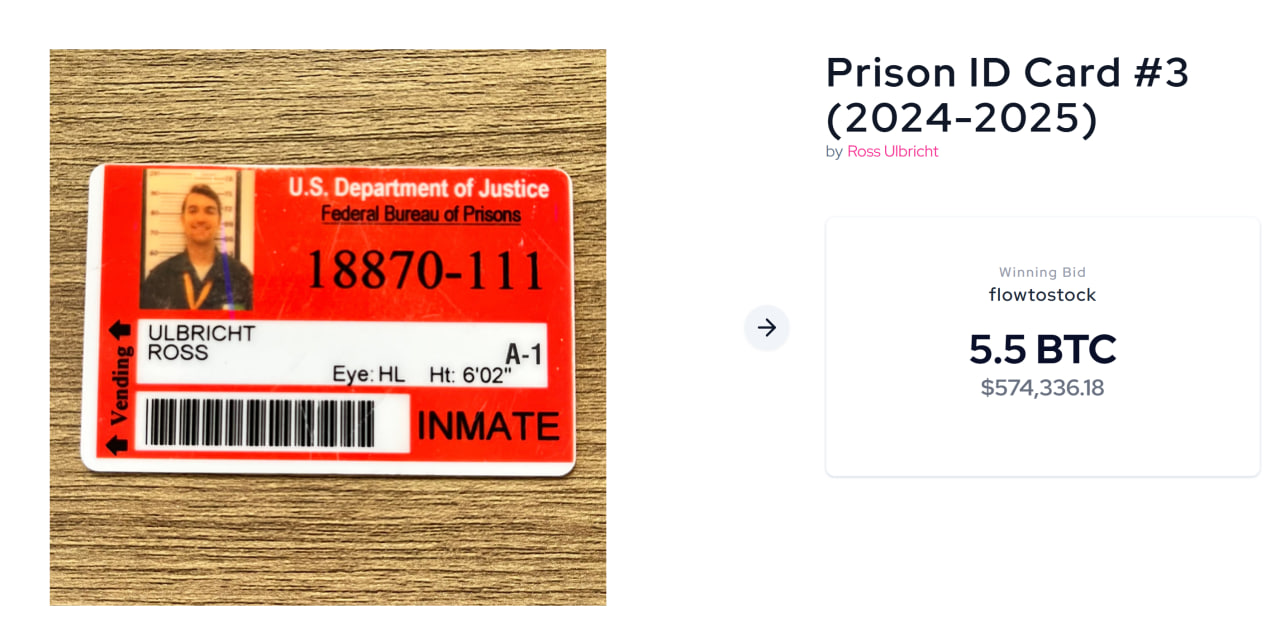
A Bitcoin-Fueled Auction of History
The crypto community and history buffs alike recently witnessed a unique event: an auction of personal belongings belonging to Ross Ulbricht, the founder of the infamous Silk Road marketplace. The auction, hosted on the Bitcoin-only marketplace Scarce City, proved to be a resounding success, netting over $1.8 million in Bitcoin. This event underscores the enduring fascination with the early days of crypto and the figures who shaped its narrative, even those shrouded in controversy.
Items and Their Significance
The items up for auction were a diverse collection, ranging from pre-arrest personal effects to memorabilia created during Ulbricht’s incarceration. The collection included a sleeping bag, backpack, drum, a lock, notebook, clothing, and several paintings. Notably, Ulbricht’s final prison ID card fetched a staggering 11 BTC, equivalent to over $1.1 million at current prices. This particular item holds significant weight, a tangible symbol of Ulbricht’s past and the complex legacy of Silk Road. His comment on the photo, “The guard tried to get me to stop smiling for the photo, but my joy comes from within… So I smiled that day, even though I was in prison,” hints at his defiant spirit.
Artwork and Community Participation
Beyond the personal items, artwork created collaboratively with a fellow prisoner, known as “Omega”, garnered substantial interest. This collaborative painting secured a winning bid of 1.01 BTC. Ulbricht’s reflection on the artwork, “It gave me the feeling that, if I could pass through it, something better would be on the other side,” offers a glimpse into his mindset and the transformative power of art within confinement. The auction’s structure included a 1% collateral deposit for bidders and a countdown timer reset for last-minute bids, ensuring a fair and competitive environment. While Bitcoin was preferred for payments, smaller PayPal transactions were also accepted, demonstrating a degree of accessibility.
The Shadow of Dormant Bitcoin Wallets
The auction‘s success comes with an intriguing subplot: the potential existence of millions of dollars in dormant Bitcoin wallets linked to Ulbricht. Coinbase director Conor Grogan identified approximately 430 BTC, valued at roughly $47 million, held in wallets untouched for over 13 years and never seized by authorities. Blockchain analytics firm Arkham Intelligence corroborated this assessment, tracing 14 Bitcoin addresses connected to Silk Road, with one address alone containing over $9 million in BTC. This discovery raises questions about the future of these holdings and potential future legal considerations, especially given Ulbricht’s pardon by former President Donald Trump.
The Broader Implications
The auction highlights several crucial aspects of the crypto landscape. Firstly, it demonstrates the tangible value placed on historical artifacts and the enduring interest in the early years of Bitcoin. Secondly, it spotlights the importance of understanding and tracking the flow of Bitcoin, and the ongoing challenges associated with the legacy of Silk Road. Finally, it forces us to consider the complexities of justice, redemption, and the evolving relationship between the crypto community and the legal system. The sale of Ulbricht’s items, whether viewed as a celebration of crypto history or a controversial event, undeniably keeps the conversation surrounding Bitcoin’s past at the forefront of the industry.



